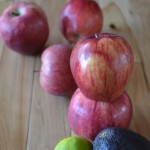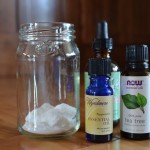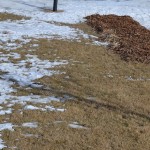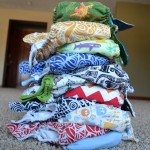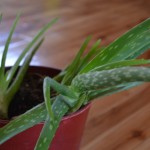For today’s post, I thought it would be fun to list the things we do to minimize our impact on the environment. Hopefully I can give you some ideas you may not have thought of yet. Many of these items fit in more than one category, so I just picked the most obvious one.
Reduce
Our success at this one is a product of Buddhist practice, frugality, and environmentalism. But it is at the top of the list for a reason. In my opinion, reducing is the best thing your household can do to reduce environmental impact. We go through one small kitchen bag of trash every three weeks or so, and our very large recycle bin takes at least four weeks to fill. You can reduce how many materials you use and your consumption of resources such as fuel and water. Here are some of the things we do:
Water: To reduce our water consumption we wear our clothes more than once, shower less often (a wet washcloth is all you need between showers if you don’t have a sweaty, dirty job), wash dishes by hand, don’t flush every time, and turn off the water while washing hands, brushing teeth, etc. We don’t use car washes. Rain usually works, but sometimes I will wipe my car with a wet rag. And we are working on converting the lawn to edible landscaping and replacing the grass with less water-intensive vegetation.
Electricity: We do not use a TV (for other reasons, but it’s still green) and keep unused appliances unplugged. Think laptops, toaster, coffee pot, blender, baby monitors, etc. We use minimal lighting and only at night, use energy efficient appliances, and line-dry all clothes and diapers in the non-frozen months. We mow the lawn with man-powered reel mower, drive fairly fuel-efficient cars, and Dylan walks or rides bike to/from school.
Material consumption: See “Reuse” section
Reuse
Reusing is next best. Reusing assists in reducing, so many of these actions go hand-in-hand. Here are some examples from our home:
Disposable items: We do not use disposable items in our house. The only exceptions are packaging and recycled toilet paper. We use cloth diapers, family cloth, a menstrual cup or mama cloth, handkercheifs, and towels for cleaning and napkins. We use reusable shopping bags and reuse freezer bags until they fall apart and then upcycle or recycle.
Second-hand purchases: I would say at least 90% of what I buy is used, not including food. This includes our clothes and outerwear, furniture, baby items, toys, picture frames, etc. Some of the exceptions are bottles (because I wanted glass), pacifiers, socks; things you usually can’t find or don’t want, for sanitation purposes, used. When we do buy new, we try to keep plastic consumption low, choose based on company ethics and packaging, and resell when possible.
Upcycle/Recycle
Upcycling is different than recycling. Upcycling involves taking something used and turning it into something of equal or greater value. For example, you can upcycle magazine pages into paper beads for jewelry or paper tubes for basket weaving. I always try to upcycle before recycling, which involves the use of resources to break down the substance and turn it into something else, usually of lesser value.
Natural/Chemical Free Choices
Reducing your chemical consumption is not just good for the Earth, it’s also good for your health.
Cleaning products: The only cleaning products we buy are natural dish soap, Borax, and Oxyclean Green. We make our own laundry detergent from equal parts baking soda, washing soda, and Oxyclean Green. Windows and mirrors are washed with a wet cloth and then dried with a Norwex polishing cloth. This makes them streak-free and chemical free. Bathrooms are cleaned with a half-and-half vinegar-water solution with a few drops of tea tree oil and a shaker bottle of baking soda. I dust with only a wet Norwex cloth. The hard floors are mopped with hot water with a little vinegar and lemon essential oil. For carpets, stains can be cleaned with vinegar-water and odors can be treated with baking soda and a vacuum. Bonus: these cleaning methods are cheaper and smell better. No, my house never smells like vinegar.
Pests and Weeds: We do not use pesticides, but we do trap and release or deter them in natural, humane ways. For example, fruit flies can be baited into a jar with a small piece of fruit. A paper funnel placed into the opening allows them to fly in, but they usually can’t find their way out. After a day or two, I will free them outside. We do not spray herbicides, either. Sometimes we will squirt vinegar in the hole after pulling dandelions. Our lawn is not a uniform plot of blades of grass. We have weeds. I’m not worried about it. (See this post if my weeds irritate you.) Weeds perform a specific function – revitalizing nutrient-deficient soil. I won’t get too far into it. The grass is on it’s way out as we slowly transform our yard.
Health and Beauty: We make our own toothpaste from baking soda, peppermint stevia, and tea tree oil. We use all natural/vegan soaps, shampoo, conditioner, and deodorant. I make hairspray with boiled sugar water and grapefruit essential oil. I texturize my hair with a sea salt spritz. I don’t wear makeup anymore. If I decide to again some day, I will find some better alternatives. For moisturizer, I use oils, usually coconut or sweet almond oil, but I’ve just ordered some new stuff from Essentially Blessed Boutique, a friend who sells hand-made, 100% natural beauty items. I’ve heard only great things about her product! For soaps and candles, I love Pacifica brand. They have sustainability and ethics woven into their very core, and their products smell oh so yummy. We also work to keep our pharmaceutical consumption at a minimum. We eat healthy, stay active, meditate, and use natural cures whenever possible, which is easier than you might think.
Clean Eating and Gardening
Buying organic is not just better for your health, it is better for the environment. However, organic food from the store has its downfalls. Organic farmers can still spray their crops with pesticides and herbicides as long as they are made from organic substances. They most likely employ monocultures, which seem, on the surface, to produce the greatest output, until you start learning about permaculture. And it can get expensive.
Enter the home garden. I firmly believe that growing your own food is one of the highest forms of empowerment. When you grow your own food, you know exactly what has not been sprayed onto your own food and how well you’ve treated your precious soil. My goal is to eventually grow 80-90% of our own food. We have years to go until that goal is reached. Here is what else we do:
We are vegetarian. The animal product industry is extremely bad for the environment. This topic could fill a book so I will refrain from elaborating.
We compost. Composting is probably a huge reason that we produce very little garbage. We throw all our food scraps and food that has gone bad into the compost bucket in the kitchen and then periodically bring it out to the bin. Easy. I plan to create a compost pile soon, because our bin is almost full and South Dakota winters make for slow composting. Compost is a free and wonderful soil amendment for your garden.
Much of the food we buy is organic, and we very rarely eat at restaurants, which makes up for the extra money spent on organic groceries. But by refraining from eating at restaurants, we also are not contributing to the large amount of waste (food, garbage, packaging, water, etc.) that they produce.
Others
Some of our choices don’t fall into any of the above categories.
We educate our children on the importance of treating the Earth with respect. Sometimes we spread the word to other kids, too. Last year for Earth Day, I bought used children’s books that pertain to the Earth for all of Dylan’s kindergarten classmates. I went to the classroom and talked to them briefly about being green and let them each choose a book.
We decorate with plants instead of new decorations. They make the house prettier, but they also purify the air and provide humidity.
The little things. It has become natural for me to think about the environment in every choice I make. I reuse a piece of cheesecloth for coffee filter, we replaced ruined bed sheets with fair-trade, bamboo-organic cotton, we use biodegradable toothbrushes and garbage bags, and so on.
So there you have it. I think we do a pretty decent job with being green. There is always room for improvement. I think that should be my motto.
Are there things you do that I have not mentioned? Do you have questions? Let me know below or shoot me an email!
